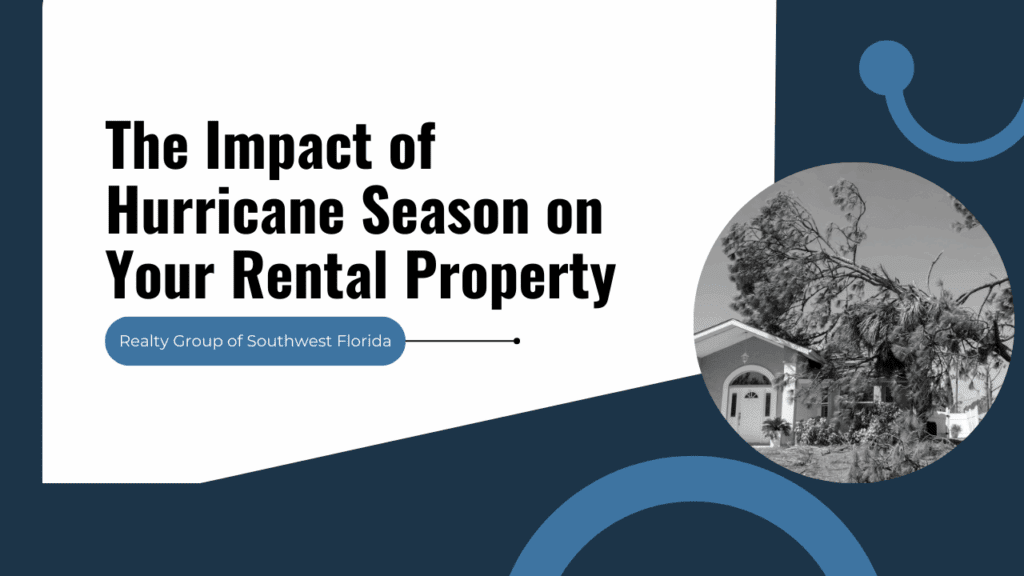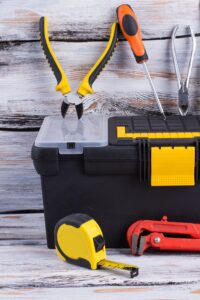
We’ve had some active hurricane seasons over the last few years, and if you own investment property in southwest Florida, that probably has you thinking about risk and recovery.
Hurricane season has an impact, especially when tropical storms roll through and named hurricanes can be seen taking out homes and drowning seaside cities.
Along the southern Gulf of Mexico (Gulf of America? Help us out…), we’re always preparing for hurricanes and remaining vigilant in our preparation. Storms seem to have become stronger, but so, too is our technology. We now have hurricane shutters and windows and roofs that are being made to withstand higher than normal wind speeds.
It’s not easy to prepare for hurricane season, but it is manageable.
We’re looking at the impact hurricane season has had on tenant demand, real estate, and insurance. We’re also reminding investment property owners in Florida about what they can do to best protect their rental property here.
Property Damage in Florida Rental Properties
Are you still making repairs after Hurricane Milton? Maybe you’re even dealing with the long-term effects of Hurricane Ian. When we talk about the most common impacts that hurricanes and even tropical storms can have on your rental property when it’s located in Florida, we have to start with property damage.
The most immediate concern during a hurricane is structural damage. Strong winds can rip off roofs, shatter windows, and damage siding, while flooding can affect foundations and interiors. Investors often face expensive repair bills after major storms.
Once a storm comes and goes, an owner’s first priority will be assessing the damage. Once the area is safe enough to enter, you’ll want to take a look at what kind of property damage has been left behind. It might be something easily dealt with, like a compromised deck or a few missing roof shingles. Or, it could be something worse, like standing water in the house, trees coming through windows, or debris blocking doors. Take photos and videos of all visible damage, and check the less obvious areas such as attics and closets and HVAC systems.
Once the damage is assessed, take steps to prevent further destruction by addressing critical issues quickly. This might mean boarding up broken windows and doors or putting a tarp over the roof that is leaking. You’ll need to remove standing water and dry out affected areas to prevent mold.
Securing your rental property’s structural integrity will make the restoration process smoother and protect the tenants and property from further risks.
This is the time to be grateful for your partnerships with reliable contractors. A lot of scammers start showing up after storms, offering to assess your roof or look at your damage. Deal with the vendors and service providers you already know. Ensure quality repairs by contracting with providers through your property management company or collecting multiple quotes from well-screened contractors.
We maintain a trusted network of contractors to handle hurricane damage efficiently.
Insurance Costs and Florida Hurricanes
Florida has been dealing with a bit of an insurance crisis over the last few years, and one of the reasons for this is the high risk of hurricanes. The costs and the challenge in finding good insurance has eased a bit as new insurers have moved into the state.
But, back to back hurricanes in 2024 resulted in a lot of claims and a lot of stress on the insurance industry. That could mean higher costs in the future. This is a real effect that hurricanes have on your rental property. After significant hurricanes, insurance providers often reevaluate their risk exposure in affected regions, frequently leading to increased premiums for property owners in areas like the Gulf Coast. These rate hikes are designed to offset the rising cost of claims and account for future risks.
Additionally, property owners may face stricter policy terms, including higher deductibles for wind or flood damage.
Filing claims after a hurricane can also be a complex process. Owners must provide thorough documentation of property damage, including photographs, repair estimates, and receipts for any immediate mitigation expenses. It’s common for insurers to experience a surge in claims following hurricanes, which can lead to delays in processing and payout. Proactively understanding your coverage, maintaining up-to-date policies, and keeping detailed records are essential strategies for navigating these challenges effectively.
Investment properties in hurricane-prone areas require comprehensive insurance coverage. While insurance offers peace of mind, high premiums can cut into your bottom line. Additionally, deductibles for hurricane-related damage are often higher than standard deductibles, which impacts out-of-pocket expenses.
Disruption to Rental Income
Hurricanes can disrupt rental income in several ways.
- If a property is damaged, repairs might render it temporarily uninhabitable.
- Even when properties escape damage, tenants might evacuate and not come back.
- For vacation rentals or short-term properties, you can expect hurricanes to cancel bookings, leaving profitability vulnerable.
There’s also the loss of demand, which can impact hurricane-sensitive markets. After a hurricane hits, tourism understandably tends to dip temporarily in areas impacted by the storm. Travelers may avoid regions considered risky, which could cause a seasonal decline in income for short-term Florida rentals.
Similarly, for long-term rentals, displaced tenants may be forced to vacate to find safer housing, leading to unexpected vacancies.
Regions dependent on tourism can take weeks—or even months—to recover from a major storm’s economic aftershock. And while hurricanes don’t automatically lead to a drop in property values, repeated storm damage could make your Florida rental properties seem less appealing to renters and buyers. This perception might slowly chip away at your property’s long-term value, making it harder to attract quality tenants or sell at a premium down the road.
While some properties bounce back, others may experience a decline if located in high-risk flood zones. This can influence long-term profitability and exit strategies.
Strategies to Safeguard Your Gulf Coast Rentals
The impacts can be painful, but when you’re prepared, a comeback isn’t out of the question. Here are some of the strategies we always use to help our owners and investors, and even our tenants, prepare for hurricane season and mitigate any of the worst damages that can be done.
- Invest in Hurricane-Resistant Upgrades
Investing in hurricane-resistant upgrades can help protect your property and tenants. These include installing impact-resistant windows and doors. Homes that had these features fared much better in the last few hurricanes that have impacted our area. You’ll also want to consider reinforced roofing systems, which are gaining popularity in Florida. Make sure your structures are elevated to the point that there’s less of a flooding risk. Those beachfront homes are on stilts for a reason. By reinforcing your property, you reduce damage and potentially lower insurance costs.
- Review Insurance Coverage and Make Sure It’s Comprehensive
Always opt for comprehensive property insurance that includes as much coverage for hurricanes as is possible. Consider policies that cover wind damage, flooding, and loss of rental income. Working with an insurance broker who specializes in Florida investment properties can provide valuable insight. If you’re not reviewing your insurance regularly, now is the time to start. We can make sure referrals if you don’t already have a great insurance agent.
- Stay Committed to Proactive Maintenance
A property that’s deteriorating will not fare well in a hurricane. Routine inspections and maintenance go a long way in preventing hurricane-related damage. Clear gutters, maintain landscaping to reduce debris, and regularly inspect your roof and windows. Make preventative maintenance a priority when it comes to your rental property.
- Create Emergency Preparedness Plans
Prepare a hurricane response plan for your rental properties. Share evacuation protocols with tenants, stock properties with emergency supplies, and have trusted contractors ready to assess damage post-storm. You’ll want a plan for communicating with tenants, whether they plan to evacuate or shelter in place during the storm. You’ll want them to have all of the resources they need, including access to emergency first-responders and local and federal government agencies such as FEMA.
- Consider Flood Zones Carefully
When purchasing rental properties in this part of Florida, assess their location in relation to FEMA-designated flood zones. Properties in lower-risk areas are less likely to suffer significant flooding and may have lower insurance premiums.
The Role of Professional Property Management
 We can help you prepare for and recover from hurricanes.
We can help you prepare for and recover from hurricanes.
Navigating the complexities of owning Florida rentals during hurricane season can be overwhelming. Partnering with a professional property management company ensures your investment is well cared for. From maintaining properties to coordinating repairs and communicating with tenants, property managers offer invaluable support.
This is Florida, and while hurricanes are an undeniable part of life, they don’t have to derail your investment in rental properties along Florida’s southwest coast. By proactively protecting your property and income streams, you can minimize disruptions and achieve sustainable returns on your real estate investments.
If you’re considering expanding or improving your Florida property portfolio, now is the time to consult with experts. Contact Realty Group of Southwest Florida. We partner with real estate investors in Estero, Bonita Springs, Naples, and throughout Fort Myers and Cape Coral.
